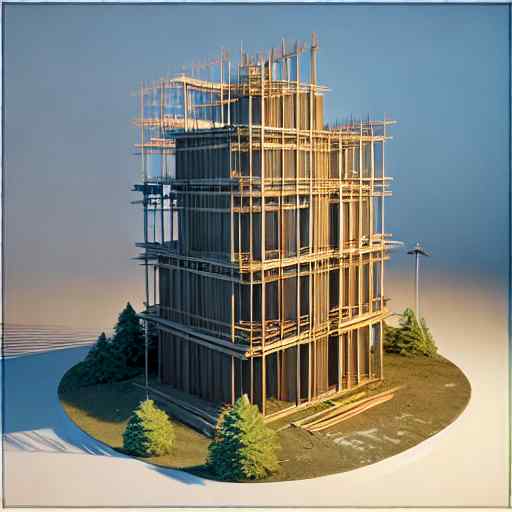Defining General Contractor: Unraveling The Role & Importance

What is the meaning of general contractor
Introduction: The Nuts and Bolts of a General Contractor
A Quick Snapshot: Who is a General Contractor?
A general contractor, also commonly referred to as a main contractor or prime contractor, is the conductor directing the orchestra of a construction project. They are the maestros of building who pull together all the disparate threads of a project into one harmonious outcome. Just as every symphony needs a guiding hand to meld the sounds of each instrument into unified music, every construction process requires an overarching figure to guide it to successful completion.
But what does this really mean in practical terms? Think of any structure that you see around you -- your home, office space, or even your favorite shopping mall.
A general contractor has been pivotal in bringing that edifice from concept to reality. They oversee day-to-day operations on a construction site right from groundbreaking till ribbon-cutting and are responsible for providing all material, labor, equipment, and services required for the successful execution of any building project.
What makes this role so significant is its blend of management acumen and practical skills -- contractors not only need to negotiate contracts and manage personnel but also solve problems at ground zero on-the-fly! In essence, general contractors act as veritable magicians who turn blueprints into bricks-and-mortar realities.
The ABCs of General Contracting: An Overview
The field of general contracting is intrinsically intricate due to its multifaceted nature. While it primarily involves managing construction projects such as buildings or infrastructure like bridges or roads; it encompasses much more than just overseeing bricklaying events!
To start with - imagine trying to handle everything from scheduling inspections with local officials or coordinating with architects about design nuances while keeping an eye on budget constraints and ensuring timely delivery. It's about steering clear through muddy waters filled with potential pitfalls like legal issues concerning property rights or permit battles while ensuring everyone involved in the project - right from electricians and carpenters down to plumbers & painters - synchronize their efforts flawlessly.
The profession demands both specialized knowledge such as reading architectural drawings or understanding modern building codes along with astute business skills like effective communication for negotiation & conflict resolution. It means constantly juggling between multiple hats--sometimes an accountant crunching numbers on spreadsheets while at other times playing diplomat amidst labor disputes.
So when we talk about understanding what being a general contractor means - it's not just about 'building' things! It's about wearing multiple hats under one helmet: being an expert planner, skilled negotiator, agile problem solver & meticulous organizer all rolled into one unstoppable force that propels construction projects towards successful completion.
Digging Deeper: Roles and Responsibilities of a General Contractor
Wearing Many Hats: Diverse Roles of a General Contractor
When you hear the title 'General Contractor,' it's like gazing upon a Swiss army knife in the world of construction. They are packed with diverse skills and play manifold roles that vary from project to project. At its essence, the general contractor is akin to an orchestral conductor.
They oversee every phase of a construction job, from initial conception to final ribbon cutting. A general contractor is also the maestro of troubleshooting.
When unexpected issues crop up - as they invariably do in construction projects - they possess the practical know-how and experience to find solutions swiftly. Everything from dealing with unplanned site conditions, material shortages, or delays falls within their purview.
Another noteworthy role is being an effective communicator. Whether it's keeping clients updated on progress or coordinating with architects and engineers for design details, general contractors are constantly juggling conversations across all levels of operation.
Master Coordinator: Managing Subcontractors
Navigating the labyrinthine world of subcontracting is no mean feat - but for a general contractor, it's all part of the day's work. The subcontractor puzzle begins with choosing competent specialists for each task -- electricians, plumbers, masons -- you name it! This involves assessing their skills objectively while keeping in mind budget constraints.
The general contractor's role transcends merely hiring; they also excel at coordinating these myriad professionals so that work flows smoothly on site. Picture yourself keeping track of not just one task but several tasks simultaneously -- it's almost like conducting an intricate ballet where everyone has their unique part to play!
Apart from coordination, any disputes among subcontractors fall under the jurisdiction of the general contractor as well. Their responsibility is ensuring harmony at work while maintaining high standards throughout every stage.
Paperwork Whiz: Handling Permits, Insurance, and More
Construction projects don't just involve bricks and mortar; there's also reams worth paperwork involved! This bureaucratic side might seem tedious but is absolutely crucial for any project's legal backbone -- and guess who holds mastery in this arena?
Yes indeed! The versatile general contractor!
The permits required can range from land use approvals to specialty permits like electrical or plumbing permits. It takes discernment to understand what permits apply when and where--a discernment that our trusty contractors have honed over years.
Beyond permits lies insurance handling--another vital aspect managed by general contractors. From workers' compensation coverages to liability insurances pertaining job-related injuries or property damage--our reliable Swiss-army-knife-like professional adeptly navigates these intricacies ensuring compliance while safeguarding interests involved.
The Journey to Becoming a General Contractor
Laying the Foundation: Essential Qualifications and Skills
Constructing a character suitable for general contracting doesn't happen overnight. It requires an amalgamation of both tangible qualifications and intangible skills, diligently acquired over time.
High school education supplemented with courses in math, carpentry, and mechanical drawing lay the groundwork for this journey. Intrinsically, successful general contractors display a robust blend of leadership abilities, problem-solving skills, and an adept understanding of building methods and materials.
A keen eye for detail coupled with superior organization skills helps in keeping projects on track. More importantly, excellent communication is key as it's instrumental in coordinating among various teams while also maintaining effective liaison with clients.
But certainly not leastly, possessing business acumen helps in cost estimation and negotiation - crucial aspects that influence the viability of construction projects. Thus one can say that the path to becoming a general contractor truly calls for a well-rounded skill set.
Blueprint to Success: Education and Training Pathways
Aspiring general contractors often start their odyssey into this profession through post-secondary education programs like construction science or construction management offered by technical schools or colleges. These programs imbue students with knowledge about project management principles - right from blueprint reading to understanding building codes.
An alternate route involves hands-on training garnered through an apprenticeship under seasoned professionals in the field. This offers priceless practical exposure supplementing theoretical knowledge gained through formal education.
Some embark on their journey as construction workers amassing experience over years before stepping into the shoes of a contractor. Whether they choose academia or apprenticeships as their portal into this career, all pathways demand continuous learning given ongoing advancements in building methodologies and regulatory norms within the industry.
Climbing the Ladder: Licensing and Certification
Much like any renowned profession demanding responsibility towards public safety, becoming a legitimate general contractor requires securing licensing from state authorities post meeting certain prerequisites which may include passing exams or proving financial stability among others. Further proof of professional competency comes from voluntary certifications offered by organizations such as The American Institute of Constructors or The Construction Management Association of America which entail rigorous exams assessing knowledge across varied domains including safety regulations, quality management etcetera.
Essentially acquiring licensing signals society's permission signaling entry into this prestigious fraternity whereas gaining certification constitutes public acknowledgement for one's mastery within it. Together they represent pivotal rungs in one's ascent up the ladder within this vocation.
A Day in the Life of a General Contractor
From Sunrise to Sunset: A Typical Workday Run-down
The life of a general contractor is anything but typical. Every day, they grapple with tasks as diverse as the projects they undertake.
Most mornings start early, often well before sunrise. The first order of business is usually catching up on correspondence and managing time-sensitive administrative work, punctuated by copious amounts of coffee.
As the day advances, it transforms into an orchestrated ballet of construction site visits, procurement tasks, and scheduling responsibilities. It's not just about checking on progress; it's about ensuring that every cog in this colossal machine is turning correctly and in harmony with others.
There could be subcontractor meetings to discuss specific trades or more granular aspects of the project. The latter part of the day can often find them back at their desk, drafting reports or preparing bids for upcoming projects.
There's also closing out any unresolved issues from earlier in the day or planning for tomorrow's commitments. And although a general contractor's workday might extend well beyond traditional hours - when it comes to building dreams, there isn't really an off switch.
On-the-Job Challenges and How They Overcome Them
Like any profession involving complex logistics and a myriad of stakeholders, being a general contractor comes with its share of challenges. One such challenge includes balancing quality workmanship with budget constraints and deadlines without compromising safety standards. While this may seem like an overwhelming feat to many, seasoned contractors navigate this tightrope walk by utilizing sound project management skills and fostering strong relationships with reliable subcontractors.
A common hurdle faced by general contractors is handling unanticipated issues on-site that could potentially delay progress or inflate budgets - think hidden structural problems during renovations or unforeseen weather events during exterior works. They overcome these obstacles through thorough risk assessment before project commencement combined with maintaining excellent communication channels amongst all parties involved throughout execution stages.
Perhaps one of the most delicate challenges deals with conflict resolution among crew members or between clients and subcontractors -- essentially people management skills are essential here! From addressing grievances head-on to mediating disputes diplomatically while keeping everyone's interests at heart -- successful contractors understand that beyond bricks and mortar -- construction is very much a people-centric business!
Behind the Scenes with Subcontractors
A Spotlight on Subcontractors: The Unsung Heroes of Construction
When it comes to the world of construction, we often grant the limelight to architects and general contractors, inadvertently overlooking a critical group -- subcontractors. Essentially, subcontractors are specialist tradespeople who are hired by general contractors to perform specific tasks that fall within their area of expertise. This could include anything from electrical work and plumbing to carpentry or even landscaping.
Subcontractors bring an incredibly specific skill set to the table; they've honed their craft through years of focused training and experience. They might work independently or as part of a small team, but regardless, they are not employees of the general contractor.
Instead, they're contracted for certain parts of a project based on their professional niche. Imagine a construction project as an intricate symphony.
In this comparison, while the conductor (the general contractor) ensures everyone hits their notes at the right time for beautiful harmony, subcontractors are akin to each musician playing their unique instruments flawlessly. They're absolutely vital in achieving that complete beautiful masterpiece.
Navigating Relationships: The Delicate Dance between General Contractors and Subcontractors
At this point you might be wondering how these two professional forces -- general contractors and subcontractors -- interact and collaborate effectively on complex projects. After all, with so many moving parts involved in any given project, ensuring everyone works together seamlessly is no small feat!
The relationship between general contractors and subcontractors can best be described as symbiotic; each party relies heavily on the other for successful project completion. While the general contractor holds ultimate responsibility for project oversight - setting timelines, coordinating logistics, managing different teams - they also rely heavily on subcontractor expertise in different areas such as electrical installations or HVAC system setup.
Conversely, while subcontractors excel at their individual crafts, they depend on the direction provided by general contractors who orchestrate when and where each trade fits into overall project execution. It's not just about performing tasks in isolation; it's about understanding how each piece fits into a larger puzzle - something only possible with clear communication channels established by proactive general contractors.
In essence then - like dancers perfectly synching steps in a grand ballet performance - both parties need to move rhythmically together for successful execution! Each must know when it's their turn to shine centre stage before seamlessly transitioning focus onto next performer without breaking rhythm or disrupting harmony.
Understanding Contracts in Construction World
Decoding Construction Contracts - What's In There?
In the world of construction, contracts serve as the foundation stone, delineating a clear map of the journey that lies ahead. In essence, they are legal agreements negotiated and agreed upon by involved parties -- the client and general contractor primarily -- outlining project specifics such as scope, timelines, payment terms, and more.
The first layer within these contracts typically encapsulates a detailed description of work. This involves not just what is to be built or renovated but an exacting depiction of materials to be used, finishes to be applied and architectural elements to be incorporated.
Essentially anything that defines the project's final outlook is meticulously stated here. Next within this legal labyrinth are timelines & schedules.
These include commencement dates, phased milestones if applicable, and ultimate completion dates. It's important to note that contingencies for unexpected delays - such as those due to weather or material shortages - are usually recognized within these clauses.
The Importance of Contracts for a General Contractor
Contracts do more than just manage client expectations; they're essentially safeguards that protect both parties involved in the project. For general contractors specifically, contracts act as shields against unpredictable circumstances while defining clear avenues for dispute resolution should conflicts arise. One facet where this stands out is liability coverage.
Construction projects aren't devoid of risks - accidents can happen even under utmost vigilant environments leading to damages or injury on site. The contract elucidates which party bears responsibility in such instances thus insulating a general contractor from unwarranted claims.
Essentially the contract dictates how variations from initial plans will be handled whether it pertains to changes in design plan or alterations due unexpected complications during construction process - all without leaving financial loopholes unattended. Above all else perhaps is its role in ensuring payment security for services rendered by contractors.
The contract outlines payment schedules aligning them with various stages of work completion thereby securing cash flow throughout project timeline right until successful handover. Then it's evident how indispensable contracts are for general contractors - they're not mere documents but comprehensive guides ensuring smooth navigation through intricate terrains of construction landscape.
Navigating the Financial Landscape as a General Contractor
The Art and Science of Project Budgeting
In the world of general construction, understanding project budgeting is not only a necessity but an art. It requires careful balancing of cost estimates, material prices, labor expenses, and an added contingency fund for unforeseen circumstances. A general contractor must be proficient in number crunching, but also carry a deep knowledge of current market trends and prices.
A typical budget starts with cost estimation which entails detailed analysis of materials needed - from nails to concrete, labor cost which accounts for all the workers' wages, and other miscellaneous fees like permit costs or rental equipment. On top of these main areas lies the contingency budget--usually about 10% to 20%--to cushion any unexpected costs.
Ultimately, mastering this art ensures that projects are financially feasible before they commence and stay on track throughout their completion. This is crucial because when projects go over budget due to poor financial management it can lead to significant losses or even bankruptcy.
Profit Margins, Bids, and Beyond
The financial prowess required by a general contractor does not end at sound project budgeting. A critical part involves understanding profit margins and navigating through the bidding process -- arenas where business acumen meets industry expertise.
The profit margin in any construction project depends on several factors such as efficient work methods that reduce labor hours needed or smart procurement strategies that lower material costs. Savvy general contractors often negotiate better deals with suppliers or find innovative ways to cut down costs without sacrificing quality.
Remember that higher profits are not necessarily about charging more; they're often about spending wisely. Besides squeezing out profits within tight budgets, another financial challenge for general contractors is drafting competitive bids that win contracts while ensuring profitability.
To do this effectively requires comprehensive market knowledge (to understand what competitors might bid), precise cost forecasting (to avoid underestimating expenses), plus an inherent knack for strategic pricing (to make your bid attractive yet profitable). It's essentially a high-stakes game where one miscalculation could spell loss instead of profit.
The Impact of Technology on General Contracting
A Melange of Modernity: New Tools on the Block - Tech Advancements in Contracting
There is a profound adage that states, "Necessity is the mother of invention," and it has no shortage of application in the world of general contracting. The digital age, which seemed to blossom almost overnight, has unfurled a vast array of tools designed to make life as a general contractor both more efficient and effective.
One such tool that deserves mention is Building Information Modeling (BIM) software. This revolutionary technology allows contractors to generate and manage digital representations of physical and functional characteristics throughout the construction process.
It provides an immersive 3D model that can be manipulated and viewed from various angles, giving everyone involved in the project an accurate visual representation before even breaking ground. Another tech advancement that's been making waves among general contractors is cloud-based Project Management Software (PMS).
These tools have become indispensable for synchronizing tasks, tracking progress, managing documents, controlling costs, and communicating with teams and clients effectively. With real-time updates accessible from anywhere around the globe, these software solutions increase productivity while decreasing the chance for costly errors or delays.
Futuristic Facelift: How Technology Is Changing the Role of General Contractors
While it might seem like these technological advances are strictly practical tools for ease-of-use or efficiency's sake -- they pack much more punch than that alone. Modern-day technology isn't just about new gadgets; it's reshaping traditional roles within various professions -- including general contracting.
Firstly, with access to advanced tools like BIM software or PMS platforms, contractors now find themselves needing to master new skills outside their conventional scope. Today's successful contractor doubles as a tech-savvy professional who must stay ahead of evolving technology trends while still maintaining adeptness at their core construction competencies.
Secondly, technology is shifting how general contractors interact with their clients. Virtual reality (VR) walkthroughs offer clients an immersive preview into what their finished projects will look like - further enhancing customer involvement during early project stages.
Yet importantly, digitization has brought about greater transparency in operations - something highly sought-after within this industry plagued by cost overruns or project delays due to miscommunication or lack of coordination. It can be said that embracing technology isn't merely an option but rather a requisite for today's general contractors who wish not only survive but thrive amidst this ever-evolving landscape.
Applauding the Architects of Achievement: Building Appreciation for General Contractors
In an era where we applaud innovation and creativity, let's pause for a moment to acknowledge the dexterous architects of our built environment -- the general contractors. These professionals don a variety of hats, each as crucial as the other, orchestrating harmonious symphonies out of construction chaos. From meticulous planning to efficient execution, their contribution transcends beyond brick and mortar; they give substance to dreams and shape to aspirations.
At a construction site teeming with activity, general contractors are like seasoned conductors guiding an orchestra. They synchronize diverse instruments - subcontractors specializing in various realms - to play in tune with the grand composition that is your dream project.
Thus ensuring that you get not just a building but a well-coordinated piece of art that stands testimony to their skill and your vision. Moreover, these unsung heroes shoulder immense responsibility from dawn till dusk (oftentimes beyond) daily.
They navigate through unexpected challenges with resilience and radiate optimism even when faced with formidable hurdles. Their unwavering commitment does not merely result in tangible edifices but also instills intangible trust among all involved parties.
A Cornerstone of Confidence: Final Thoughts on the Importance of this Profession
As we go about our lives surrounded by towering skyscrapers or cozy homes, seldom do we ponder over what breathed life into these structures? Who was at the helm steering these projects towards successful completion?
The answer is invariably - General Contractors! They are not just builders; they are creators who mold visions into reality.
Their expertise lies not only in understanding technical blueprints but also in empathizing with people's dreams, fears and hopes associated with any construction project big or small. They tread this delicate balance between practicality and sentimentality making them indispensable for any effective construction process.
Furthermore, as technology advances at lightning speed transforming industries across the globe, general contractors too have embraced these changes enhancing their efficiency while ensuring safety standards. Their adaptability underscores their relevance making them pillars of progress in an ever-evolving world.
Conclusion
General contractors are much more than meets the eye--they're essential catalysts setting wheels into motion on every construction site. Here's raising a toast to all those who skillfully navigate through heaps of paperwork one day , deal with delayed deliveries another day yet never lose sight , quite literally ,of building our dreams . Their work is indeed cast in stone (and concrete), shaping civilizations one structure at a time.



